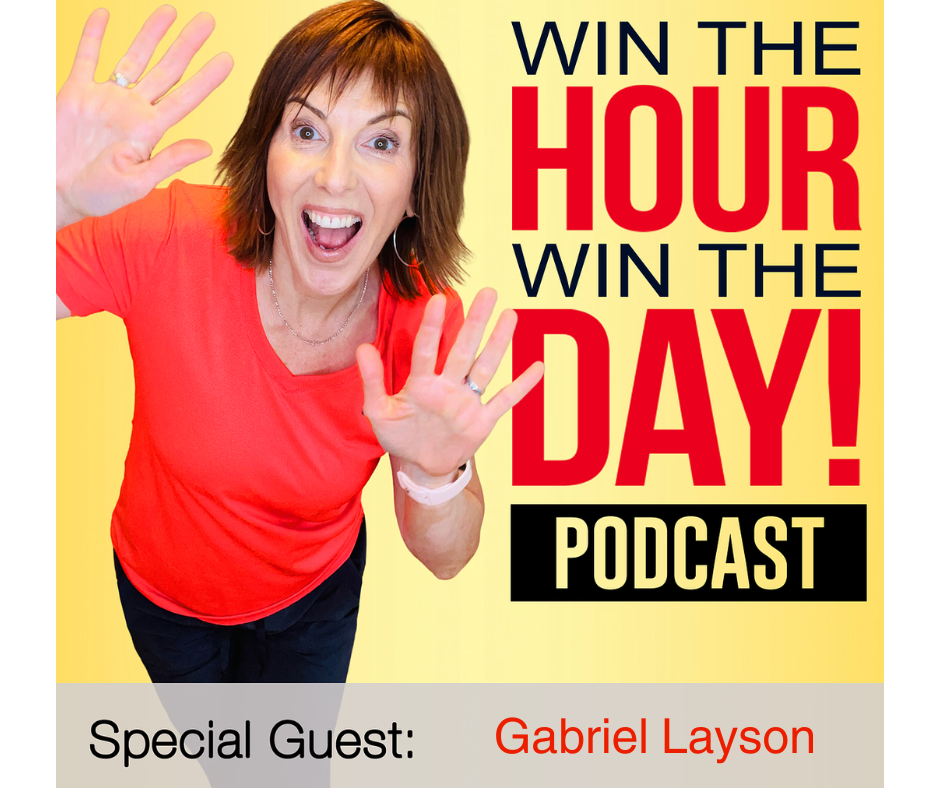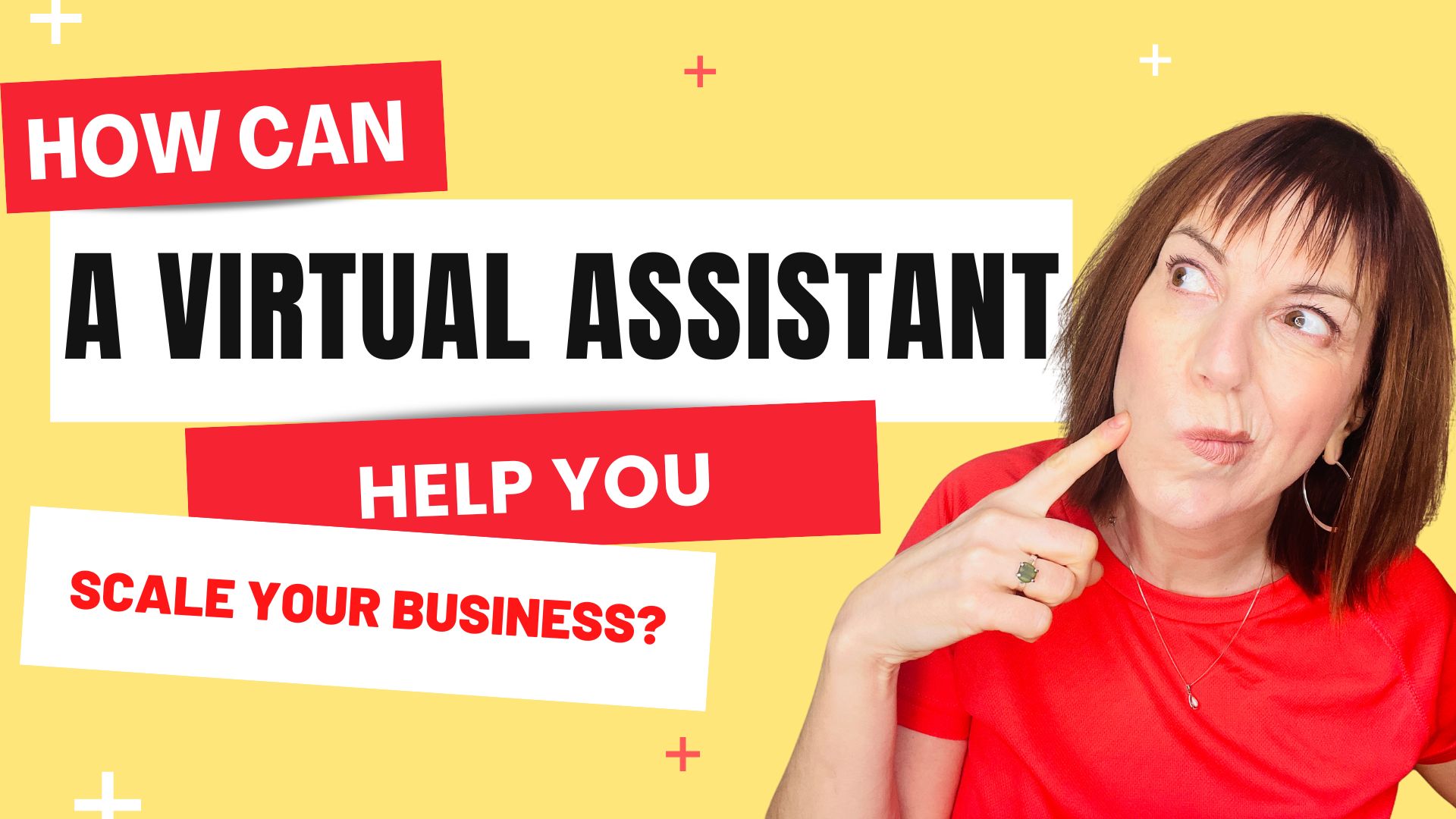Episode Summary
This week’s episode of Win The Hour, Win The Day Podcast interviews, Gabriel Layson.
Ever felt lost at work because no one gave clear directions?
Join Kris Ward and Gabriel Layson as they share what really happens when virtual assistants are told to “just figure it out” — and how strong systems and good leadership can fix it fast.
In this eye-opening talk, you’ll learn
-Why unclear tasks can cause stress and mistakes.
-How daily scrums help you stay calm and focused.
-The power of using the right words to ask questions.
-How Super Toolkits make every job easier to follow.
-Why good leaders help, not manage.
Get ready to see how clear steps, kind words, and better systems can turn pressure into progress.
Win The Hour, Win The Day! www.winthehourwintheday.com
Podcast: Win The Hour, Win The Day Podcast https://podcasts.apple.com/ca/podcast/win-the-hour-win-the-day/id1484859150
Facebook: https://www.facebook.com/winthehourwintheday/
LinkedIn: https://www.linkedin.com/company/win-the-hour-win-the-day-podcast
Win The Hour Win The Day
https://winthehourwintheday.com
Gabriel Layson Podcast Interview
[00:00:00] Kris Ward: Hey everyone. Welcome to another episode of Win The Hour Win The Day and I am your host, Kris Ward. And today in the house we have Gab Layson and we are gonna tell like a tell it all behind the scenes. This is what happened. And Gab is one of the WIN team members, our virtual assistants in our Leadership Program who works with one of our clients.
[00:00:19] Kris Ward: And he went through something that is very commonplace and happens quite a lot, and I just thought we’d get a lot of insight and learning from this. So Gab is willing to share his story. Welcome to the show, Gab.
[00:00:32] Gabriel Layson: Hello. Thank you so much for getting me here, Kris. I really appreciate it.
[00:00:37] Kris Ward: Okay, so let’s start at the beginning.
[00:00:39] Kris Ward: You work with one of the, we find, hire and onboard entrepreneur sorry, virtual assistants and we put them in our Leadership Program for entrepreneurs. Okay. So you came through that funnel. You’re working with your WIN team leader and you start off, good things are fine, but then you did start to have [00:01:00] some things that weren’t working. A little bit of frustration. Wanna include me in on that?
[00:01:04] Gabriel Layson: Yeah. So basically I started with my WIN team leader in April, and everything’s good. And okay. While it actually lasted and then suddenly what happened is that my WIN team leader went on vacation for about three weeks. Okay.
[00:01:21] Gabriel Layson: And I had my manager. Technically managed me. He’s one of our team members on our team, and it was okay at first. It’s just that I did not expect him to be managing me the way he did. It became very challenging because most of the time I’ve been given tasks. That’s number one I’m not really familiar with.
[00:01:45] Gabriel Layson: So yeah, I was not able to give a hundred percent of the result that is being provided. And then almost every day I’m gonna be getting a message and I was like, getting anxious on did I do something wrong again? Yeah. Is there something that I did that he didn’t like? So yeah, it became a bit of stressful situation for me because I really had a hard time sleeping on that.
[00:02:11] Gabriel Layson: Waking up, going through shift, checking the messages, checking the past that I’ve been.
[00:02:16] Kris Ward: Yeah. Yeah. That’s hard way to live. Yeah. So he, to be fair, he has, she went away and he had no training. Like he, there’s management and then there’s leadership. So he had no training in management. He’s giving you responsibilities and one of the responsibilities that you did get was it was about getting people on their podcast.
[00:02:38] Kris Ward: So they’re saying, “Hey, can you reach out? Get us some people on the show, reach out to people we know and don’t know and get them on the show. So that was difficult for you.” I did hear, because the way we’re set up. I was hearing from her, you one team leader, Hey, you know what?
[00:02:55] Kris Ward: I’m asking him to do stuff and then every time he shows up, it’s not [00:03:00] done and there’s an excuse and I’m like let’s find out what’s going on there because we’ve got such a good hiring process. I saw your potential. I was thinking, no, I think there’s something more there. So that was part of it too, is you were given a request that really I’ll be, I’ll say it in case you won’t, it was vague and you were unclear and you weren’t comfortable with your current manager ’cause she was away asking questions. ’cause you, every time you ask questions, there seem to be some pushback or friction or that whole philosophy.
[00:03:28] Kris Ward: I love this when they say, just take the ball, run with it. And I say, run with what? Where. So they expected you to take the ball, run with it, get all these guests for the show, and it wasn’t working out and you were under a lot of stress.
[00:03:41] Gabriel Layson: Yes, that is actually right. Okay. Especially for the podcast part since that’s not something that I’ve actually done before.
[00:03:47] Gabriel Layson: And I’ve tried asking if we actually have a specific process that they’ve been doing prior to me being part of the team. Unfortunately, we did not have, yeah. So that was the challenging part when it comes [00:04:00] to pursuing that task. Number one, I didn’t know where to start. Number two, I did not have any instructions on what are the things that I have to look forward to or what are the things that I have to consider when I am checking who are the best people to be on the podcast and who are the best people who can also have my WIN team leader as a podcast guest, right?
[00:04:22] Gabriel Layson: So that was really the challenge where I did not know where to start from and what are the guides that I could, that I could have on the, on the process itself.
[00:04:33] Kris Ward: Right? So then I said to her, okay, here’s the deal. Why don’t you? We developed also, we have many touch points in the Leadership Program.
[00:04:41] Kris Ward: We have monthly lives, we have weekly action items, and then we also have this intern program where you come and join our meetings and see how we run scrums, which are our daily like huddles. ’cause we don’t believe in weekly meetings and we, we have scrums, we’ve done this before. We bring people in and it’s just a, an immersion learn from the environment.
[00:04:59] Kris Ward: So I thought it would [00:05:00] give us a chance to, you’d see how we run our scrums. We get to know you a bit better and see where we can offer you some support. So you joined, you came in and did the internship, and you were with us, I think, I don’t know how long was it you, were you with us? A couple weeks? Three weeks to be exact.
[00:05:15] Kris Ward: Three weeks. Okay. Yeah. So you came to our scrum meetings every day for three weeks, so I’ll tell you what I learned from that. You tell me what you learned.
[00:05:24] Gabriel Layson: Yeah, sure. So first, with regards to the internship program, I was actually surprised that there is this type of program and I did not know before that we really have this under your Leadership Training Kris? Yeah. At first I did not really expect it to have that big of an impact when it comes to me personally and also when it comes to me professionally, especially on the task and the work that I’m doing with my team leader. But as the day goes on, there has been a lot of differences that I have observed.
[00:05:55] Gabriel Layson: Number one, when it comes to how you handle your meeting with your team with your team [00:06:00] members as what I’ve shared with my team leader. It’s not like there’s like a boss or someone that is Yeah higher than anyone else. And everybody actually speaks for themselves. Yeah. And they rarely apologize.
[00:06:13] Gabriel Layson: That’s one thing.
[00:06:14] Kris Ward: Yeah. No apologies. You bring up a really good point. So a big compliment I get is when people join our scrums, they say if they didn’t know, they wouldn’t know who’s in charge. ’cause it’s a collaboration. Because we, I don’t, I, it’s not, I’m not a teacher and you guys are the students, and then I assign work and check your work.
[00:06:30] Kris Ward: I have no interest in that. My goal is to be the dumbest person in the room, and so it’s very collaborative, so it’s run very differently. Yeah.
[00:06:39] Gabriel Layson: Yes. And also one other thing that I have served there is that. Don’t really have to tell the team or anyone else that you have a question. Yeah. You just have to ask the question itself, be spontaneous about it.
[00:06:51] Gabriel Layson: And one of the best things that I’ve really learned about the Scrum meeting that I have attended are, or one is [00:07:00] you just have to share the idea itself. It doesn’t matter if it sounds stupid to someone else or if you don’t think that it’s really as effective as it can be as long as you’re providing the ideas that you have, then the team could actually work on that idea itself, and that gives better results.
[00:07:20] Kris Ward: Yeah, you bring up a couple really good points and those are some of the things we address in the Leadership Program. So number one, you’re right, you mentioned earlier, you don’t say, sorry. Oh, excuse me, sorry. I have a question. That’s not a leadership moment. You want people to listen to you and be heard.
[00:07:31] Kris Ward: It doesn’t mean being cold or bold or rude. It just means be confident and you don’t have to you don’t have to introduce. I have a question. You say, so when would we be doing that? Like just dive in. What? These are just fillers and they’re very permissive and they’re very sub submissive. If you, excuse me, I, sorry, I have a question.
[00:07:49] Kris Ward: No, just, Hey, so when do we have to get, when is the launch of this? And you’re right. Any idea is a good idea because whether it works or not. It’s a stepping stone. It’s an idea to the next idea, [00:08:00] right? Yes. Or it’s teaching me how you think oh, I don’t know if that’s gonna work, but I love where you’re going with that.
[00:08:04] Kris Ward: Okay. Explain to me why you thought that would work. So it really is. Yeah. It’s collaboration. That’s what we’re all about.
[00:08:12] Gabriel Layson: Yeah, exactly. And also I think the biggest thing that I’ve got on the Leadership Program is the confidence to to just be yourself. That’s one thing. And also the confidence to be part of a team itself.
[00:08:28] Gabriel Layson: That you’re not just a VA. If I may say, no, you’re a WIN team member. You are there because of a reason that you are there. Because you have potential. Yeah. And the only thing that you really have to make sure of yourself is that number one, you have the skills, whether it’s technical admin or anything that actually requires on the job, and you just have to let your win team leader as well know what are your capabilities are and also the things that could help you out. One thing that I really appreciate [00:09:00] is the for your Leadership Program is that you actually have win team members that specialize on each particular skill. Like you have Maura, you have Criz handling this, you have Michael handling this, and that made me… that gave that actually gave me a lot of confidence when it comes to the task that I was not really familiar with, especially with the podcast. I really love the process that you have shared with me and it’s really effective if I may say so. Those little things that you did not have from your previous jobs really makes a difference right now
[00:09:39] Kris Ward: because
[00:09:39] Gabriel Layson: now you have, yeah.
[00:09:41] Kris Ward: Sorry, you bring up some really good points. First of all, team is a philosophy, not a number. So you can have a team of one, and we do operate under the team philosophy. So you really did hit that on the head. And the other thing is, you’re right. I’m lucky, I do have a bigger team. I think a bigger team is out of four.
[00:09:55] Kris Ward: You can run a really successful business on one or two VAs for sure. And again, that [00:10:00] we call them VAs for the sake of the show. We call them WIN team members. We don’t ever call them VAs and we don’t call the entrepreneur’s bosses. It’s win team leaders and members and stuff. The thing is, where people go wrong is they hire a VA.
[00:10:12] Kris Ward: They, oh my gosh, Gab is really good at this. He’s really good at whatever. And then they give you something else to do and something else to do, and all of a sudden they have you editing videos and doing this and all these things have nothing to do. Like they’re all different directions. Nevermind. They have no direction to give you.
[00:10:25] Kris Ward: You’re right. You asked, you’re like, okay, you want me to get you on podcasts and you want me to get guests on our show? Where do I start? What’s the process? What I learned from you, it was really interesting to me, is I could see how many holes there were in the communication where they thought they gave you information.
[00:10:44] Kris Ward: And so we’ve, I’ve had my, this podcast now, oh my gosh, for like almost six years at this point, and. Even I have a very developed process and I was like, okay, here’s, I was sharing with you. Here’s how we can get, you can get guests on the show. Here’s some things we’ve done in the past. So [00:11:00] as I’m spelling that out, you’re asking really good questions and I’m realizing there’s big holes in the information that they gave you. Like you also didn’t wanna just go on LinkedIn and you didn’t wanna be saying that you are your WIN team leader. When you’re not, you’re like, okay. ’cause then they, it looks so almost AI, like when you give a generic message that doesn’t work.
[00:11:19] Kris Ward: Nobody wants that. Nobody trusts that. If you send them a generic message you sent to everyone that we want you on the podcast, I wouldn’t even answer it. ’cause I’m like, this is just spam, right? So I said to you, no, you can say, Hey, you heard them on this show. Whatever, show A, B, C show and rebels away on holidays and she asks you to, you know your WIN team leaders away on holidays, and she asked you to reach out before she left.
[00:11:40] Kris Ward: Now it’s personalized. Even though they know it’s not from her. Now it’s oh, okay, when’s she back from holidays? So I gave you all these little things that were little nuances that really unstuck. You were professional and you could see the gaping holes of information. It’s like it wasn’t that.
[00:11:57] Kris Ward: You’re not a smart guy, you really [00:12:00] are. But really this was a marketing path to get people on a podcast and there’s a lot of little steps to it, and there could be a lot of missteps and you had no idea where to start. So to me, I learned, ah, I saw how quickly entrepreneurs, I’ve known this over the years, but I was reminded of how they give these big, broad, silly requests and then there’s no details to them.
[00:12:28] Gabriel Layson: Yeah, that is correct.
[00:12:29] Kris Ward: Yeah. A hundred percent. It also taught me, I, I’ve, we’ve just finished a whole new section, in the academy. ’cause as we find, hire and onboard VAs for entrepreneurs and we put them in our Leadership Program. We work with you, but we also work with the entrepreneurs.
[00:12:43] Kris Ward: A big part of what we do is we work with them. And so what I did after my experience with you is I built out a whole unit in the academy, which is a resource for the entrepreneurs, and they’re like five, 10 minute little micro trainings that really just opened their eyes and it really made me lean into language [00:13:00] so that when she says something like, Hey, why isn’t this done. That’s squashing you. It’s like you hitting a brick wall and you feel embarrassed and defeated, and now you’re stressed and now you have to go to the next meeting. And I don’t have this done. Whereas I now have a glossary of, Hey, why isn’t this done? Or, Hey, let me see where you’re stuck and let’s see if we can fix this together.
[00:13:20] Kris Ward: Like teaching people different ways to speak so that you are not literally losing sleep at night. ’cause you’re like, oh my gosh, she’s gonna ask me about this again. I still don’t know how to do it.
[00:13:30] Gabriel Layson: Yeah, e exactly. And it makes you feel more you are not capable of the things that are being asked from you.
[00:13:37] Gabriel Layson: Okay. Yeah. And that really affects you. Even if sometimes people would say that it’s just business as usual, but that’s something that I always disagree. It’s not always business as as usual, because most often than not, virtual assistants or WIN team leaders alike are actually people and they do take those comments or they do take those messages personally for [00:14:00] themselves, even if sometimes yeah, we don’t really show that.
[00:14:03] Gabriel Layson: But of course everything is personal. Everything that you do is personal, so it really affects you a lot.
[00:14:08] Kris Ward: Yeah. And then because you can’t have it both ways, you can’t have somebody that you care about the quality of the work you do, so you wanna do a good job on this, but you’re confused about the lack of direction and they’re missing steps.
[00:14:18] Kris Ward: So then if of course, it like stresses you out because you care. So if you want somebody to not care, that’s fine. They won’t be stressed out, but they won’t care either. And then on the other hand. It looks to them because they’ve given you vague instructions. You’re not getting stuff done, you’re showing up.
[00:14:35] Kris Ward: You don’t know how at that point to say to her, Hey, these instructions aren’t clear. I’ve asked you for notes that other people have done this. You have none. How many different ways can you say this? This, there’s, this is not a plan. Like you can’t. Now you’re trying not to be disrespectful to her, which we also, of teaching you language around that with teaching you now in the future how you ask those questions.
[00:14:56] Kris Ward: And then you don’t wanna be disrespectful to her, but [00:15:00] you’re showing up without the work done. So you look like you don’t care. That’s what she’s thinking. And then, and I think too, if it wasn’t for the Leadership Program, if this was a different job, you would’ve just stopped showing up.
[00:15:10] Gabriel Layson: Yeah. E, exactly. Because that’s something that I’ve also considered when, when the stress level was even that high. Yeah, that’s actually correct.
[00:15:18] Kris Ward: Yeah. ’cause nobody wants to get up every day and go somewhere and feel like you’re underperforming and people are. Ah, quietly rolling their eyes at you and wondering why you didn’t get stuff done.
[00:15:28] Kris Ward: I don’t care who you are. Nobody can weather that kind of silent criticism. It’s just not, it’s not inspiring. It’s not helpful. So you came, you saw how we acted in our scrums. You started to get some confidence. You asked some questions. You’re asking questions. Your questions were great. We built out a process for it.
[00:15:47] Kris Ward: For the podcast, for your WIN team leader. It wasn’t even just about building out the process. Okay, great. I’ve been doing this. I helped you build out a process for getting guests on the show. Not a problem. But it was through that process [00:16:00] that we had the ability to work with you and to teach you how to ask questions, how to show them when they’re not giving you enough information, how to speak professionally, but yet assertively, how to be confident, not to apologize when you have a question.
[00:16:12] Kris Ward: And we did all that. And boy oh boy, everybody noticed a difference in you. Like people are still commenting that they couldn’t believe there could be such a difference in such a short period of time.
[00:16:23] Gabriel Layson: Yes, e Exactly. And to to add to that, it was very effective that as of this time we’re if I may say the term was, we’re actually now upgrading how we do the podcast because prior to this, we’re just mainly concentrating on AI specialist.. Marketing specialist. But now just or just a few days ago my team leader asked me or told me that she wanted to take another route when it comes to doing podcasts this time where we wanted to be collaborating with partners. Yeah. So it’s actually very great for the business.
[00:16:57] Gabriel Layson: And that just goes to say that [00:17:00] whatever that we have done on the process of doing the podcast is definitely effective.
[00:17:05] Kris Ward: Yeah. So now it’s working. So you’re right. Not only do you go back, you’re stronger, more confident. The podcast process is working now. They’re tweaking it and taking it up to a new level.
[00:17:15] Kris Ward: So it is, you’re right, good for the business. So the podcast in isolation is good for the business in addition. Even she, your team, when team leader was like, oh my gosh, what a difference. And she’s very coachable and she’s always eager to learn. And I was saying to her, I don’t, I’m like, Hey, I don’t think it’s Gab.
[00:17:32] Kris Ward: Send him to me. I think it’s, I think you guys are just not giving clear instructions, ’cause we’re really confident about what we see in potential of hiring people. And I was like, okay, you come if I’m wrong, no problem. We’ll figure it out. But she’s oh my gosh. Like it was totally me.
[00:17:47] Kris Ward: People do not understand. The power of language. So when you were asking questions, it’s bad enough that you weren’t getting the information that you needed. That’s one thing, [00:18:00] but it was how you were responded to, and they’re not bad people. At all. They’re wonderful people. They’re working with me. They wanna learn.
[00:18:08] Kris Ward: There’s a lot of people out there that don’t even, they don’t know what they don’t know. And so many of us are following this corporate model of management, which is managing, it’s reacting, it’s managing problems, it’s not leading. So then they say to you, oh, go do, go make this happen. And they gave you no details.
[00:18:25] Kris Ward: And then when you get confused and stressed out about it. They just look at you as frankly weak and scared. Oh, he can’t.. He’s so stressed about everything. It’s oh my gosh. So I think it really just shows the power of language. ’cause all we did was give you some new language and we helped her with her language and now you guys are like a house on fire.
[00:18:44] Kris Ward: It’s all good. Like it’s fabulous.
[00:18:47] Gabriel Layson: Yes. That is actually right. And. You’re absolutely correct when it comes to having that confidence really made a lot of difference. Not just for me, but also for my team leader and for the business itself. Yeah. So it’s a work in progress. Yes.
[00:19:01] Gabriel Layson: But it’s a work in progress on both sides. The team leader and the team and the WIN team member as well. And yeah, that actually gives a better balance when it comes to the professional side.
[00:19:14] Kris Ward: That’s a good point. That’s a very good point. Okay. So what are some other things, you seem to get a lot out of it.
[00:19:19] Kris Ward: So during those three weeks, what were some other things that you noticed in our scrums? Like how we do them?
[00:19:25] Gabriel Layson: One thing that I’ve learned there really is to take the initiative, and this is something that I also observed myself, especially on the monthly Leadership Program that we have for all the WIN team members. Because before whenever I attend the the monthly meeting I was just there to…
[00:19:44] Kris Ward: we have a monthly live training. Yeah. So we have a monthly live training. So before you were coming, ’cause you had to come and you’re there just to be quiet and say, okay, I was here. Get off my back.
[00:19:52] Gabriel Layson: And now I became one of the team members who actively participates. And also I also participate a group wherein, we share the win challenges and yeah the wins and the challenges that we have, and then share it to the other win team members. I believe I became more proactive when it comes to sharing my thoughts, sharing the things that I’ve learned, sharing the things that I still want to learn. So that’s really a big thing for me because that’s not something that I would normally do prior to me being part of the internship program. So that’s interesting. Really a big one.
[00:20:27] Kris Ward: Yeah when having initiative is one thing and, but you had initiative, you need to have the space to show people you have initiative, right?
[00:20:35] Kris Ward: You need to feel safe that I can throw this out there and I often talk to the entrepreneurs about this. I will say to them, reward the behavior, not the outcome. And so what I mean by that is… if you have an idea and you throw it out and they say, oh, that’s a great idea. Okay, great. But then the next time you’re like, I don’t know if this is a great idea, what if you throw out another idea and they go, ah, I don’t know.
[00:20:54] Kris Ward: So what I say is, no, encourage the behavior, not the outcome. So what I mean by that is say, you know what, Gab, [00:21:00] I love that you take risks. I love that you speak up when you have ideas. I love that you’re always thinking. So that… It doesn’t matter if the idea is good or not. That way, you are encouraged and you’re inspired to continue the behavior that they’re looking for.
[00:21:15] Kris Ward: And that behavior is confidence speaking up, showing, sharing your voice, sharing your ideas, whether the ideas are good or not. That’s fine. If you give us five ideas, maybe two will work. Maybe only one will work. It doesn’t matter. But then we’re brainstorming, we’re collaborative. So what most people do is they just say, oh, it was a great idea.
[00:21:32] Kris Ward: And then when you don’t have a great idea, you feel oh, I, oh man, I feel embarrassed. The other one’s idea, this one was not a good idea. So what I teach them is really work on the behavior, not the outcome. And so then you have the space to feel safe because I know any, most people have initiative.
[00:21:49] Kris Ward: It’s just do they feel comfortable to share that initiative? That’s the thing. So now you’re so much more engaged because you feel safe to be engaged, you’re not gonna be judged, and so [00:22:00] then you can learn and grow and experiment and only does that benefit you and give you job satisfaction. Then, they benefit from it.
[00:22:07] Kris Ward: But that’s the thing is all these VAs where when you hear about VAs getting a bad name, it’s not them. They’re not the problem. It’s the environment. It’s the process. It’s the lack of process. It’s the communication. It’s, they don’t quit people. They quit systems. You’re like, okay, I’m not safe here.
[00:22:24] Kris Ward: They’re gonna turn on me. That’s probably how you felt. Like you said to me, you would’ve just not come back if it wasn’t for the learning, the Leadership Program, because every, they’re asking for this thing you’re not getting done. You feel more stupid every time they ask. You’re feeling like a failure.
[00:22:38] Kris Ward: So at what point is this not worth it? I’ll just get a new job.
[00:22:43] Gabriel Layson: Yeah, that is right. Exactly. And I think that’s one of the things that most often did not is being missed because how we were actually trained to be like the corporate Yeah. Standard operating procedures. Yeah.
[00:22:58] Gabriel Layson: Yeah. I think that’s one of the most [00:23:00] challenging things that we encounter, not just for me, but also for the others. With regards to the things that they have shared. It’s like nothing is actually set on stone. And I think that’s one of the things that I really appreciate about the the super toolkit because yeah, it’s an ongoing process.
[00:23:18] Gabriel Layson: Yeah. And it’s ever evolving. Yeah. And that makes it a lot easier, not just for your WIN team leader, not just for the WIN team member, but also for the other members of the team in the future. Yeah, they have a very clear guideline on how we do things, but they can also share their ideas on how it can be improved.
[00:23:36] Kris Ward: Yeah, the super toolkits are very different than SOPs and they do make them so much easier and those SOPs tend to be very outdated really quickly and they take a long time to make where the super toolkits that we created our signature program just allow you to constantly create, use and edit them, and it just takes a few minutes a day.
[00:23:53] Kris Ward: Anytime you’re doing something, it just takes a couple minutes to be working with that and it gives you so much more freedom. Oh my gosh. Okay, [00:24:00] Gab, I could talk to you all day. Give us one final thing you would like people to know.
[00:24:05] Gabriel Layson: First. I would really love if they could be part of the internship program.
[00:24:11] Gabriel Layson: Okay. Especially the teams or the other team members that that we have. Yeah. For other team leaders, because again I’ve said this over and over before, it was a life changing experience. Yeah. From the minute details, because I still remember my first my first time, being part of your scrum.
[00:24:28] Gabriel Layson: It was like, I was like. Just not looking at the camera itself, and I’m just gonna be like this. Yeah. Not really.
[00:24:35] Kris Ward: Just trying to keep your head down and keep outta trouble. That’s where a lot of people think. We’ve all had jobs like that where if, what if I’m a success, it means I’m not called out.
[00:24:43] Kris Ward: If I’m a success, it means I keep my mouth shut, my head down. If I don’t get in trouble, I’m doing a good job. So that’s the mentality. A lot of people is this is how I’m gonna get through the day. You’re right, your head was down. You’re not looking in the camera, you’re just trying to blend into the background.
[00:24:58] Gabriel Layson: Yes, exactly, [00:25:00] and it’s not something that I really expected to happen. It’s like it’s not if you’re gonna be part of the insur internship program, it’s not like they’re gonna be asking you a lot of questions. They’re gonna be asking you to do a lot of things, but it’s actually just being you.
[00:25:14] Gabriel Layson: And then they give you this feedback. The very minute details very simple things that we can improve.
[00:25:21] Kris Ward: Yeah.
[00:25:21] Gabriel Layson: And that really is it, that, that actually makes a lot of difference on how you can project yourself, how you can be more confident and how you can choose the right language with regards to the situation that you have right now.
[00:25:35] Kris Ward: Leadership language. And that’s the thing, you’re right back to, if people joined it, they wouldn’t know who’s in charge. ’cause some of my team would call you out. Like they would tell you don’t apologize before you ask a question. Or they would tell you. Hey, you gotta tell Kris I’m making a note of that because when you’re making a note of that means I stop talking.
[00:25:51] Kris Ward: If you’re gonna make a note of something, I don’t keep talking about the next thing while you’re trying to make all these notes. So when they say, let me make a note, I stop talking so they can focus on the [00:26:00] instructions, right? But they called you out on all that. Stuff, not me. So you’re right. It is a very much a culture.
[00:26:05] Kris Ward: Oh my gosh. Everyone, please share this episode with a business buddy. Don’t have them banging around by themselves. Lots of content here. Gab was so wonderful of you to share your experience and your honesty and your vulnerability with us. We really appreciate you and everyone else. We will see you in the next episode. Thank you so much.










